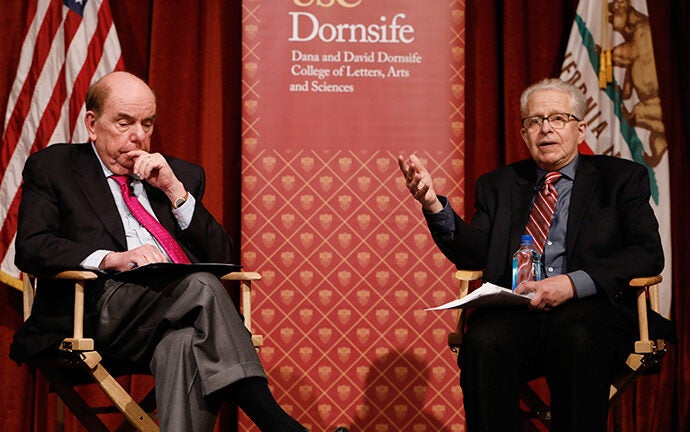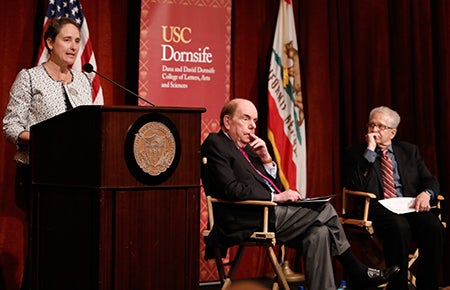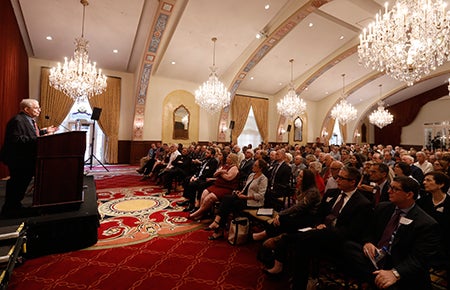
How a Russian Jewish kid from Shanghai came to take on the American president
Born to Russian refugees in Shanghai, China, in October 1941, Laurence Tribe’s life was turned upside-down before the age of one. After Japan’s sneak attack on Pearl Harbor months later, Japan occupied Shanghai. Because Tribe’s father held United States citizenship, and was therefore considered an enemy alien, he was whisked off to a concentration camp where he stayed until he was liberated by the U.S. military in 1945.
In those four years, Tribe was too young to fully understand the customs of warfare between nation states, but he could understand that his father had not done anything that justified him being taken prisoner and being separated from him and his mother. He recalled that near the war’s end, families were allowed to visit prisoners like his father.
“Even though I was just a little kid, I remember our visit well,” he said. “And what I remember a lot better than any of the visual details was my confusion and anger — really fury — at the injustice of it all.”
As the featured speaker of the 2017 Carmen and Louis Warschaw Distinguished Lecture, Tribe, a renowned legal practitioner and professor of constitutional law at Harvard University, shared how his Jewish roots were critical in shaping his worldview. The event, which took place Sept. 11 at Town and Gown on the University Park campus, included Tribe’s address followed by a conversation with Robert Shrum, Carmen H. and Louis Warschaw Chair in Practical Politics and professor of the practice of political science.
Serving the greater good
Tribe’s father, a Russian Jew, had fled his home in Belarus as a teenager to escape the Tsar’s armies. His departure saved him from extermination by the Nazis when Germany invaded Poland and Belarus during World War II, though Tribe noted that other members of his family were not so lucky.

USC Dornsife Dean Amber Miller (left) welcomes the audience to the annual Carmen and Louis Warschaw Distinguished Lecture at USC.
“That is probably the main thing that ultimately led me into law,” Tribe said. “It was a combination of close calls and a mounting sense of injustice and accident that my Jewish roots as a Russian refugee born in war-torn Shanghai instilled in me.”
One of those close calls occurred when Nazi Colonel Josef Meisinger, known as “The Butcher of Warsaw,” travelled to Shanghai and proposed to Japanese officials several ideas for the so-called “Final Solution” for the city’s Jews. Among other ideas, Meisinger suggested packing Jews onto ships and either setting them adrift or drowning them.
“The plan was to have us all perish on Passover,” Tribe said. Luckily for him and the thousands of other Jews living in Shanghai at the time the Japanese resisted the proposition.
Tribe’s parents taught him that the deepest traditions of their Jewish culture included a search for justice and the hunger for learning and truth. Perhaps, he said, the most significant obligation was to pay forward through public service whatever good fortune one experienced.
Tribe has lived that mantra, representing the rights of people who, he said, “might otherwise have been squashed by the system.” His clients include Muslims affected by the Trump administration’s travel ban, “Dreamers” protesting the removal of their protected immigration status under the proposed DREAM Act, newspapers challenging their exclusion from criminal trials and same-sex couples arguing for marriage equality.
Tribe on Trump

Laurence Tribe addresses a full house during his lecture on Sept. 11, 2017, at Town and Gown.
Tribe is part of a team of prominent constitutional scholars and attorneys who have filed a lawsuit alleging that President Donald Trump is violating the Constitution by allowing his businesses to accept payments from foreign governments. The Emoluments Clause, they argue, prohibits the president from accepting gifts and payments from foreign powers to limit the possibility that his loyalty may be corrupted.
Tribe is also currently writing a book that will explore the role of impeachment in the past and its proper function today. During the lecture’s question-and-answer session, Tribe explained that impeachment is a process that should not be taken lightly.
“Impeachment is not a silver bullet,” he said. “It’s not a panacea. We obviously don’t want to do it as a first resort, only a last resort when constitutional crises mount and threaten to become catastrophic and uncontrollable.
“Ending a presidency, as Benjamin Franklin said long ago, it really is our alternative to assassination. We don’t want to do it in circumstances that, in the effort to heal the country, will cause bloodshed in revolution.”
Putting civility at the fore
In introducing the lecture series, USC Dornsife Dean Amber Miller noted that we are living in a tremendously divisive moment, and that makes it more important today than ever to find ways to challenge each other, to think intelligently about difficult ideas and to do it in a civil way.
“Of course, these discussions are going to be provocative, but that’s what research universities are all about: learning to ask and respond to challenging questions that rise above partisanship,” she said.
The annual lecture was established in 1999 by philanthropists and community leaders Carmen and Louis Warschaw who have had a lasting impact on Southern California and its political evolution. Carmen Warschaw’s commitment of time and resources was key to developing the USC Casden Institute for the Study of the Jewish Role in American Life. Their daughter, Hope Warschaw, continues to build upon their legacy of service and commitment.
“The intention of the Warschaw Lecture is to reveal how Jewish heritage has influenced leading Americans who are in public life in one way or another,” said Shrum. “Larry, in my view, very eloquently and persuasively rooted his commitment to equal rights and defending the Constitution to the experiences he had as a young child when his family fled to Shanghai and his father was in a concentration camp.”
Hosted by the USC Casden Institute for the Study of the Jewish Role in American Life, the lecture has brought some of the top contributors to U.S. politics to USC to share ideas about their work and how their Jewish heritage has influenced their thinking. The event is part of a tradition at the university of providing students with experiences that expose them to diverse opinions and perspectives.